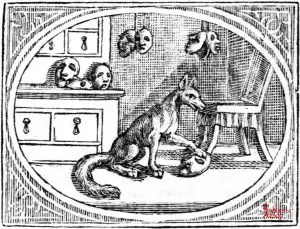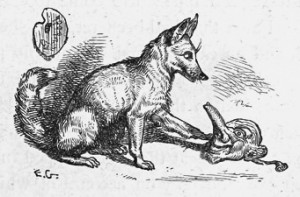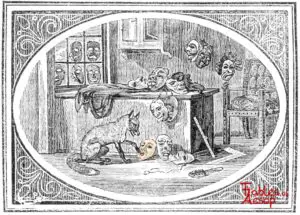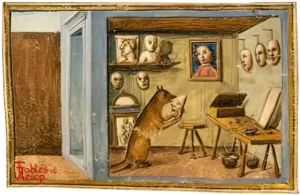A Fox looks at a mask and wonders where the mask’s brains are.
Outside show is a poor substitute for inner worth.

Eliot/Jacobs Version
A Fox had by some means got into the store-room of a theatre. Suddenly he observed a face glaring down on him and began to be very frightened; but looking more closely he found it was only a Mask such as actors use to put over their face. “Ah,” said the Fox, “you look very fine; it is a pity you have not got any brains.”

Samuel Croxall (The Fox and the Vizor-Mask)
A Fox, being in a shop where Vizor-Masks were sold, laid his foot upon one of them, and considering it awhile attentively, at last broke out into this exclamation: Bless me! says he, what a handsome goodly figure this makes! what pity is it that it should want brains!
THE APPLICATION
This is levelled at that numerous part of mankind, who, out of their ample fortunes, take care to accomplish themselves with every thing but common-sense. In short, the whole world is a masquerade; and a man of a tolerable talent for observation may entertain himself as well as the mixed assemblies he meets with in life, as at the most magnificent and expensive revels provided and ordered for that purpose. Many of the faces one meets with among the gay frolick part of our species, if searched for brains, would appear as arrant Vizors as that in the fable.

JBR Collection
A Fox was one day rummaging in the house of an actor, and came across a very beautiful Mask. Putting his paw on the forehead, he said, “What a handsome face we have here! Pity it is that it should want brains.”

Townsend version
A fox entered the house of an actor and, rummaging through all his properties, came upon a Mask, an admirable imitation of a human head. He placed his paws on it and said, “What a beautiful head! Yet it is of no value, as it entirely lacks brains.”

Thomas Bewick (The Fox and The Vizor Mask)
A Fox being in a shop where Vizor Masks were sold, laid his foot upon one of them, and considering it awhile attentively, at last broke out into this exclamation: Bless me! says he, what a handsome goodly figure this makes! what a pity it is that it should want brains!
APPLICATION.
The accomplished beau in air and mein how blest, His hat well fashioned, and his hair well drest, Is yet undrest within: to give him brains Exceeds his hatter's or his barber's pains.
This Fable is levelled at that numerous part of mankind, who, out of their own ample fortunes take care to accomplish themselves in every thing but common sense, and seem not even to bestow a thought upon the important consequences of cultivating their understandings. The smooth address and plausible behaviour of the varnished fop may indeed pass current with the ignorant and superficial, but however much he may value himself upon his birth or figure, he never fails exciting the contempt or the pity of men of sagacity and penetration, and the ridicule of those who are disposed to amuse themselves at the folly and vanity of such as put on the mask of wisdom to cover their want of brains.
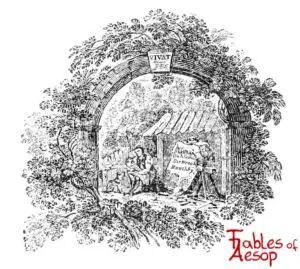

L’Estrange version (A Fox and A Carv’d Head)
As a fox was rummidging among a great many carv’d figures, there was one very extraordinary piece among the rest. He took it up, and when he had consider’d it a while, well, (says he) what pity ’tis, that so exquisite an outside of a head should not have one grain of sense in’t.
Moral
‘Tis not the barber or the taylor that makes the man; and ’tis no new thing to see a fine wrought head without so much as one grain of salt in’t.

Crane Poetry Visual
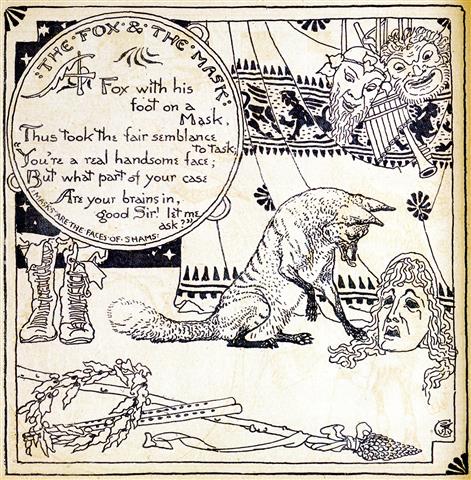
A Fox with his foot on a Mask,
Thus took the fair semblance to task;
“You’re a real handsome face;
But what part of your case
Are your brains in, good Sir! Let me ask?”
Masks are the faces of shame.

Gherardo Image from 1480

Vulpes et Statua
In statuarii officinam irrepserat vulpecula ac, contemplando diversi generis et variae formae effigies, magnam voluptatem capiebat. Inter omnes tamen, una muliebris corporis statua imprimis vulpem delectabat, ad quam et accedebat et sermonem instituebat et blandissime alludebat. Sed, statua immobili persistente, vulpes, indignata, “Quam formosa facies,” inquit, “cerebro caret!”

Lupus et Persona Tragoedi
Personam tragoedi lupus in agro invenit, quam semel et iterum vertit. “O quanta species,” ait, “et cerebrum non habet neque sensum!”
Moral
Haec fabula de illis dicitur qui gloriam et honorem habent, prudentiam vero nullam.
Perry #027
